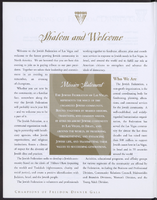Search the Special Collections and Archives Portal
Search Results

Dr. Linda K. Miller oral history interview: transcript
Date
Archival Collection
Description
Oral history interview with Dr. Linda K. Miller conducted by Claytee D. White on July 10, 2019 for Boyer Early Las Vegas Oral History Project. In this interview, Dr. Miller discusses her early life in Kansas City, Kansas and arriving to Las Vegas, Nevada in 2002. She talks about Helen J. Stewart, the Old Mormon Fort, and the significance of that area. Later, Dr. Miller explains the importance of teaching local history to people in Las Vegas. Lastly, Dr. Miller discusses the process of writing a book about Helen J. Stewart.
Text

Floyd Jenne interview, April 4, 1976: transcript
Date
Archival Collection
Description
From the Ralph Roske Oral History Project on Early Las Vegas; OH-00944. On April 4, 1976, Gordon Brusso interviewed Floyd L. Jenne (born 1915). The interview discussed Boulder City McGill, as well as Nevada history.
Text

Transcript of interview with Mary Kreuzer by Patricia Kohlman, December 15, 1975
Date
Archival Collection
Description
On December 15, 1975, Patricia Kohlman interviewed Mary Kreuzer (born 1923 in Las Vegas, Nevada) in her home in Las Vegas. The two discuss Kreuzer’s childhood, as well as the different addresses that she’s lived at in Las Vegas. The interview concludes with a discussion on entertainment and small businesses before the population boom in Southern Nevada.
Text

Transcript of interview with Thalia Dondero by Susan Scott, March 18, 1978
Date
Archival Collection
Description
On March 18, 1978, Susan Scott interviewed Thalia Dondero (born 1921 in Greeley, Colorado) about her experiences in Nevada and more specifically about her work as a Clark County Commissioner. Dondero first speaks about her background and the circumstances which led her to move to Las Vegas. She also talks about her children, her work with the Parent-Teacher Association, and her service with the Nevada State Park Commission. She also mentions some of her lobbying work for the development of state parks, including a project by National Geographic in which she visited multiple parks, and she later describes the development of the Las Vegas Strip. At the end of the interview, Dondero talks about her involvement in various organizations, her consideration for running for governor, and some of the topics she handles as a commissioner for the county.
Text

Transcript of interview with Robert D. Howell by Joe Sant, February 26, 1977
Date
Archival Collection
Description
On February 26, 1977, collector Joe Sant interviewed local Nevadan business owner, Robert D. Howell (born November 22nd, 1939 in Las Vegas, Nevada) in his home in Las Vegas, Nevada. This interview covers Las Vegas in the old days, from Mr. Howell’s personal experience of being born and raised in Nevada. During this interview, Mr. Howell also discusses the early above ground atomic tests, local environmental and social changes, the economic landscape, the Mormon Fort, religious beliefs, and local recreation. The interview concludes with discussion on air pollution.
Text

Transcript of interview with Russell Grater by Frederick Dougan, February 10, 1977
Date
Archival Collection
Description
On February 10, 1977, Frederick Dougan interviewed Russell Grater (born 1907 in Lebanon, Indiana) about his career in the U.S. National Park Service. Grater first talks about his move to the Southern Nevada area and his work that impacted the Hoover Dam project. He then talks about the town of St. Thomas, Nevada, the Lost City, and the activities of tourists. Grater also talks about his work in excavation, the indigenous American Indian tribes of the area, findings on petroglyphs, and the types of wildlife that were found in the area. He later talks about findings related to fossils, gold mining, the effects of World War II on the dam project, and vegetation in the area.
Text

Transcript of interview with Linda Hartley by Pauline Marchese, March 10, 1978
Date
Archival Collection
Description
On March 10, 1978, Pauline Marchese interviewed her neighbor, Linda Hartley (born in 1941, in Cedar City, Utah) in her home at 5261 South Jane Way, Las Vegas, Nevada. During the interview, the two discuss Hartley’s personal history, such as schools that she had attended and her recollection of local recreational activities. The two go on to talk about changes in crime, the environment, and briefly discuss a variety of issues at the time, including: segregated schools, prostitution, and effects of the Nevada Test Site.
Text

Edith Leavitt interview, February 7, 1977: transcript
Date
Archival Collection
Description
On February 7, 1977, collector Enrico Messina interviewed Edith Leavitt (born April 12th, 1924, in St. George, Utah) at her home in Las Vegas, Nevada. In this interview, Mrs. Leavitt talks about teaching in Southern Nevada, including in the Virgin Valley and in Las Vegas. She also discusses the changing education system in Southern Nevada during her time as an educator.
Text

Jack K. Leavitt interview, February 28, 1979: transcript
Date
Archival Collection
Description
On February 28, 1979, collector Alick Dziabczenko interviewed Jack Leavitt in Las Vegas, Nevada. In this interview Mr. Leavitt talks about his childhood in Las Vegas. He also talks about his family life and his career in the city, as well as some of the many changes he has seen in Las Vegas.
Text

